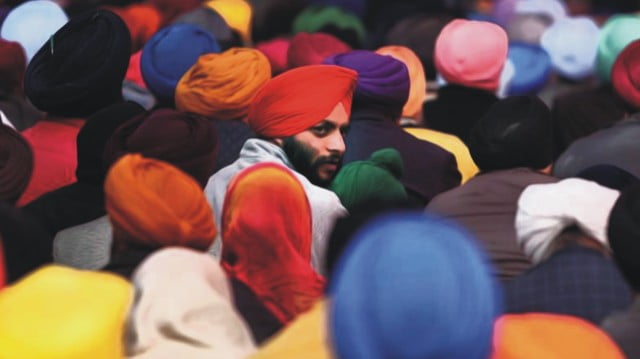

NORMALLY, the Sikh discourse articulates two kinds of Sikhs based on geography: The Sikhs who live in Punjab and those who live in the Diaspora. However, there is another dispersed Sikh community which almost never figures as a party in this discourse. These are the Sikhs who live outside Panjab but within the borders of India.
According to the previous census 2011, the total Sikh population in the world is: 2.5 crore. Out of this 1.9 crore Sikhs live in Punjab. 42.5 lakh Sikhs live in the Diaspora. 17.5 lakh are those Sikhs who live in India but outside Punjab. Their number would be a little higher than the oil-rich nation Qatar.
It is this community that bore the brunt of the big watershed moment of the nation and the Sikh community – the 1984 anti-Sikh pogrom. Except when 1984 is used rhetorically, the lives and conditions of this dispersed community is a gaping silence in the Sikh discourse.
There are many ways these Sikhs reached these parts of the country – right from the period of Guru Nanak and Guru Tegh Bahadur in Assam and Bihar, the Vaikom Satyagraha (1924-25) in Kerala and onto Tamil Nadu, the deployment of Sikh soldiers in British Army during both the World Wars in South Asia when Calcutta was a major war port, the Exodus from Burma (1942), the Partition of India and Pakistan, and finally through many central government services all over India where upon retirement the Sikhs chose to settle down.
While the Shiv Sena’s alliance with Bhartiya Janata Party blows hot and blows cold, is currently cold as in they are no longer an alliance, the Shiromani Akali Dal has been BJP’s oldest partner – almost a quarter century. Right from the late 1990s, the SAD-BJP alliance has been a marriage of convenience and one not based on ideology.
The SAD, a hundred years old party, is premised on the Sikh religion which stands for justice and equality. The BJP is a right-wing Hindutva nationalist party that believes in and works with the caste system.
It is in this scenario that we need to consider the changed relationship of SAD with the BJP caused by the resignation of Bibi Harsimrat Kaur Badal from the Union Cabinet. The readiness with which Bibi Harsimrat Kaur Badal’s resignation was accepted shows that the BJP has come a long way since the Lok Sabha elections of 1998 and 1999, in both of which it won 182 seats.
Also Read: The Trust Deficit in Harsimrat Badal’s Resignation
When the SAD-BJP alliance began, BJP was a party on the ascent, trying to challenge Congress’ hold on national politics. It needed every party opposed to Congress in its fold. SAD was a prime candidate. But now, since 2014 and 2019 general elections, where BJP won comprehensively, the BJP does not really care about SAD support which anyway does not get it many seats from Panjab.
This reduces SAD’s bargaining power with BJP. While the alliance between the two parties is still on, what happens if the alliance breaks down? While Sikhs are a minuscule minority in India, they are a majority in Punjab. That is why the politics that plays out in Punjab is very different from the politics and social pressures that the Sikhs face in the rest of India.
What will be the fallout of the SAD-BJP alliance breaking down on the tiny minority Sikhs who live outside Punjab but in India, often totalling a couple of thousands in many cities, a few lakhs in Delhi, Mumbai and perhaps Kolkata.
It is a fact that Hindutva forces in the country have grown stronger in the last seven years. These forces are actualising the Rashtriya Swayamsevak Sangh’s agenda of turning India into a Hindu Rashtra. A direct fallout of pursuing this agenda is the targeting of Muslims, Christians, Dalits and other minorities.
The question then arises, why does Hindutva not target Sikhs?
The answer, though never admitted publicly until now, is the closeness of the SAD with BJP and Hindutva forces has kept a veneer of protection around the Sikhs who live in India outside Punjab. In Punjab where the Sikhs are in majority, the Sangh seeks to appropriate Sikhs through the claim that Sikhs are the sword-arm of Hinduism. That the Sikh religion itself was created to defend Hindus from Mughals. This charge has often been refuted but the Sangh discourse continues.
Though stray incidents of Sikh persecution have taken place in the last few years, in Punjab there are often minor clashes between its various Shiv Senas – no relationship with the Maharashtra Shiv Sena, in fact misguidedly named after Lord Shiva – overall Sikhs are not directly on the Hindutva target.
As evidenced at the Ram Temple Bhoomi Pujan, the Sangh has made inroads into the Sikh community. With about 450 units predominantly in the states of Rajasthan, Delhi, Uttar Pradesh, Madhya Pradesh and Maharashtra, there is now a Rashtriya Sikh Sangat which is firmly in the Hindutva camp. Yet, that means little because there is also a Muslim Rashtriya Manch and efforts are on for a Christian affiliation. These organisations have not stopped the Hindutva attacks on Muslims and Christians.
Even if one were to look at ministers in the Union Cabinet, there is another Sikh and a Muslim minister though no Christian minister though there was one brought in later in the first term of the BJP government. That has not stopped the diatribe, the lynching(s) and the violence against the minority communities. If the SAD-BJP alliance wavers or breaks down, the Sikhs could come on the Hindutva target, especially those Sikhs who live outside Punjab but within India.
Also Read: India’s Tryst with Destiny – Hindu Rashtra
The manner in which the resignation took place, was accepted and brushed off, raises this additional apprehension in a segment of the Sikh community which has hitherto never raised its voice, never been heard. While any wrong against any minority by any majority is wrong, this is an era of majoritarian free license. The Hindutva forces has unleashed lumpenism on the streets.
It is time Sikhs outside Punjab start standing up for themselves and not always look towards Punjab for political leadership. Where they are in good numbers, they should organise themselves and be counted.
For example, in Delhi, Sikhs are good in numbers but their political awareness or involvement is limited to various sections of Akali Dal. It is the same for Sikhs in Jammu who are right now facing the issue of their language Punjabi not included in state languages.
Also Read: Sikhs and Ram Janam Bhoomi
Sikhs outside Punjab should keep a balance of idealism with realism but they should not be just spectator of wrongdoings being done by so called political powers.
One can only hope that the Sikhs who live outside Punjab find ways to keep themselves safe without compromising on the ideals and tenets of the Sikh religion. ![]()
_____________
Watch video:

Disclaimer : PunjabTodayTV.com and other platforms of the Punjab Today group strive to include views and opinions from across the entire spectrum, but by no means do we agree with everything we publish. Our efforts and editorial choices consistently underscore our authors’ right to the freedom of speech. However, it should be clear to all readers that individual authors are responsible for the information, ideas or opinions in their articles, and very often, these do not reflect the views of PunjabTodayTV.com or other platforms of the group. Punjab Today does not assume any responsibility or liability for the views of authors whose work appears here.
Punjab Today believes in serious, engaging, narrative journalism at a time when mainstream media houses seem to have given up on long-form writing and news television has blurred or altogether erased the lines between news and slapstick entertainment. We at Punjab Today believe that readers such as yourself appreciate cerebral journalism, and would like you to hold us against the best international industry standards. Brickbats are welcome even more than bouquets, though an occasional pat on the back is always encouraging. Good journalism can be a lifeline in these uncertain times worldwide. You can support us in myriad ways. To begin with, by spreading word about us and forwarding this reportage. Stay engaged.
— Team PT


Copyright © Punjab Today TV : All right Reserve 2016 - 2024 |